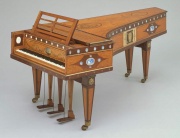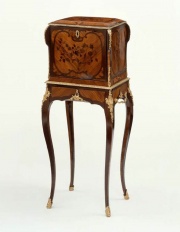Difference between revisions of "Tulipwood"
Jump to navigation
Jump to search
(username removed) |
m (Text replace - "== Authority ==" to "== Sources Checked for Data in Record ==") |
||
| Line 22: | Line 22: | ||
| − | == | + | == Sources Checked for Data in Record == |
* G.S.Brady, ''Materials Handbook'', McGraw-Hill Book Co., New York, 1971 Comment: p. 825 | * G.S.Brady, ''Materials Handbook'', McGraw-Hill Book Co., New York, 1971 Comment: p. 825 | ||
Revision as of 22:29, 1 May 2016
Description
A high quality, dense, figured wood from the Brazilian tulipwood tree Dalbergia decipulari. The name tulipwood has also been given to numerous other similar hardwoods obtained from Myrtales trees native to the Americas, such as Dalbergia frutescens (Central and South America), Physocalymma scaberrima (Brazil), and Harpullia pendula (North America). Tulipwood is used in veneers and small novelty items.
Synonyms and Related Terms
Tulip lancewood; tulip tree; pau rosa; bois de rose; pinkwood; pau de fuso; jacaranda rosa; Dalbergia decipulari; Dalbergia frutescens; Physocalymma scaberrima; Harpullia pendula; palisandro (Esp.)
| Density | 60 ppcf |
|---|
Additional Images
Sources Checked for Data in Record
- G.S.Brady, Materials Handbook, McGraw-Hill Book Co., New York, 1971 Comment: p. 825
- F. H. Titmuss, Commercial Timbers of the World, The Technical Press Ltd., London, 1965
- George Savage, Art and Antique Restorer's Handbook, Rockliff Publishing Corp, London, 1954
- Wikipedia, the free encyclopedia, at http://www.wikipedia.com Comment: http://en.wikipedia.org/wiki/Tulipwood (Accessed Oct. 3, 2005)


